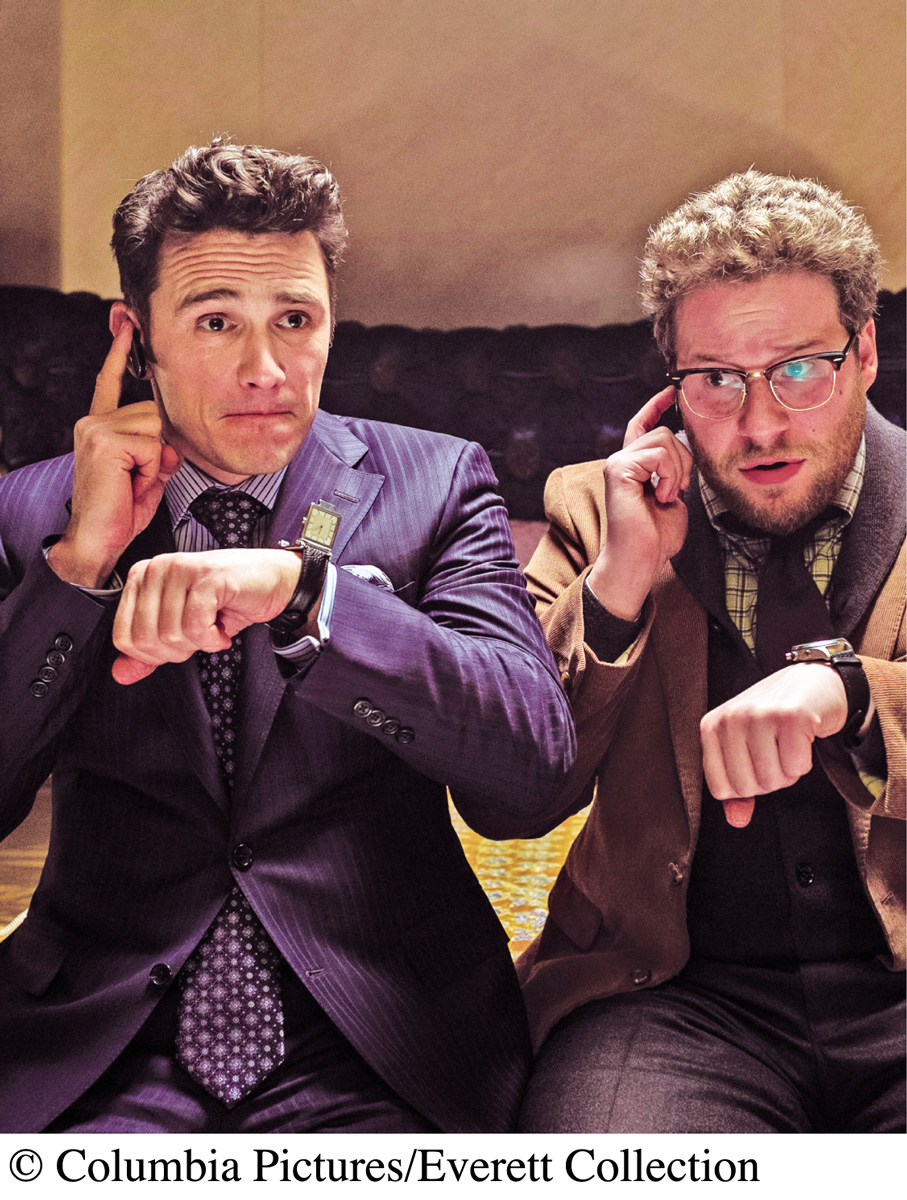Chapter Introduction
9
The Internet and New Technologies: The Media Converge

It was meant to be a raunchy comedy with a far-fetched plot: Two American journalists admired by North Korean leader Kim Jong-un are invited to come to his country to interview him, resulting in the CIA recruiting the two (played by Seth Rogen and James Franco) to assassinate the dictator. But in the final months of 2014, the events surrounding the release of The Interview made it seem more like an international drama or high-tech geopolitical spy thriller than a comedy. In a span of two months, there was a massive online attack on a major corporation and its employees, another cyber attack on an entire country, threats of a terrorist attack, the canceling of the movie’s theatrical release, and international sanctions.
On November 24, 2014, a group calling themselves the Guardians of Peace hacked Sony Pictures Entertainment—the distributor of The Interview—and released embarrassing personal e-mails of employees as well as digital copies of some unreleased films.1 Speculation began that North Korea, upset about The Interview, was behind the attacks. A few weeks later, the Guardians of Peace threatened attacks on movie theaters showing the film that Christmas. Sony announced that theaters not wishing to show the film could be released from bookings, and then briefly canceled the release entirely.
The Department of Homeland Security did not consider the warnings from the Guardians of Peace a credible terrorist threat, and President Barack Obama said the movie’s release should not have been curtailed. Meanwhile, the FBI announced it believed the hackers were indeed operating out of North Korea, although Kim Jong-un’s government maintained its denial of any involvement. On January 2, 2015, President Obama signed an executive order increasing sanctions on North Korea, citing the Sony attack as the reason.
Eventually, Sony executives decided to release The Interview as scheduled online, on demand, and in some independent movie theaters.2 But the real importance of this dramatic series of events surrounding a comedy film was summed up by Director of National Intelligence James Clapper, who in early 2015 called the Sony hack the “most serious” cyber attack up to that point on a U.S. interest.3 While notable in its scale, this wasn’t a completely isolated incident in a period that’s seen stories about massive data theft from major retailers and medical institutions, and the constant threat of phishing and identify theft (discussed later in this chapter) in the online world.
The Internet revolutionizes and encompasses all forms of mass communication—not replacing them but converging them. It connects people across great distances almost instantly and offers access to boundless information, entertainment, and more. But as the Sony hacking incident demonstrates, the interconnectivity comes with some risks and raises profound questions about security, privacy, and freedom of speech on the Internet. As you consider these issues, think about the ways in which you balance convenience and connectivity with caution and security as you go online—and the ways governments and corporations may do the same.
THE INTERNET—the vast network of telephone and cable lines, wireless connections, and satellite systems that link and carry computer information worldwide—was described early on as the information superhighway. This description suggests that people envisioned a new system for conveying information that would replace the old one (books, newspapers, television, and radio). Created in the 1950s, the Internet was a government-sponsored technology enabling military and academic researchers in different locations to share information and findings by computer. Drawing on the technology used to build the first computer (the ENIAC, invented in 1946), the Internet exploited the power of digitization. Through digitization, information in analog form (such as text or pictures) is translated into binary code—a series of ones and zeros that can be encoded in software and transmitted between computers.
In many ways, the original description of the Internet has turned out to be accurate: This medium has expanded dramatically from its initial incarnation to a vast entity that encompasses all other media today (video and audio content in addition to text). Since becoming a mass medium in the mid-1990s, the Internet has transformed the way we do business, communicate, socialize, entertain ourselves, and get information—in short, it has profoundly touched the way most of us interact with media across all aspects of our lives.
Unlike other mass media, the Internet seems to have no limits: More and more content is being made accessible on it, more and more people are gaining access to it, and more and more types of media are converging on it. But one thing is certain: As governments, corporations, and public and private interests vie to shape the Internet so that it suits their needs, the questions of who will have access to it and who will control it are taking on more urgency.
In this chapter, we explore these questions, along with the Internet’s impact on various aspects of our lives, by:
examining the early history of the Internet, including its initial uses as a military-government communication tool
tracing the evolution of the Internet to a mass medium with multimedia capability
analyzing the economics of the Internet, including the new business models it has inspired as well as the noncommercial entities that use it
considering concerns that have arisen regarding the security of personal information on the Internet and the appropriateness of content now accessible through this medium
weighing the negative and positive implications of the Internet for our democratic society